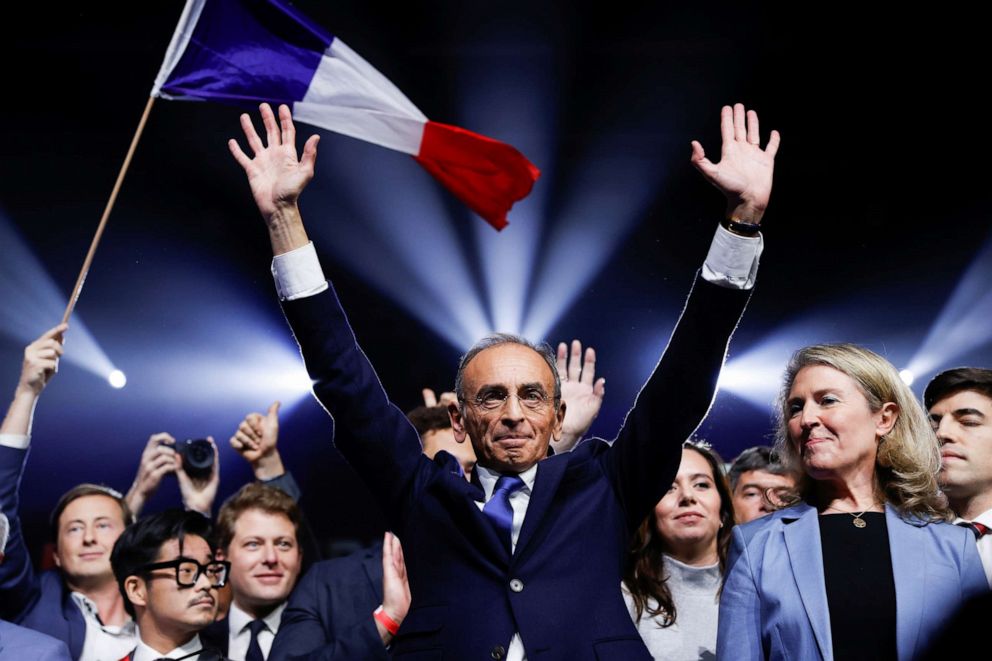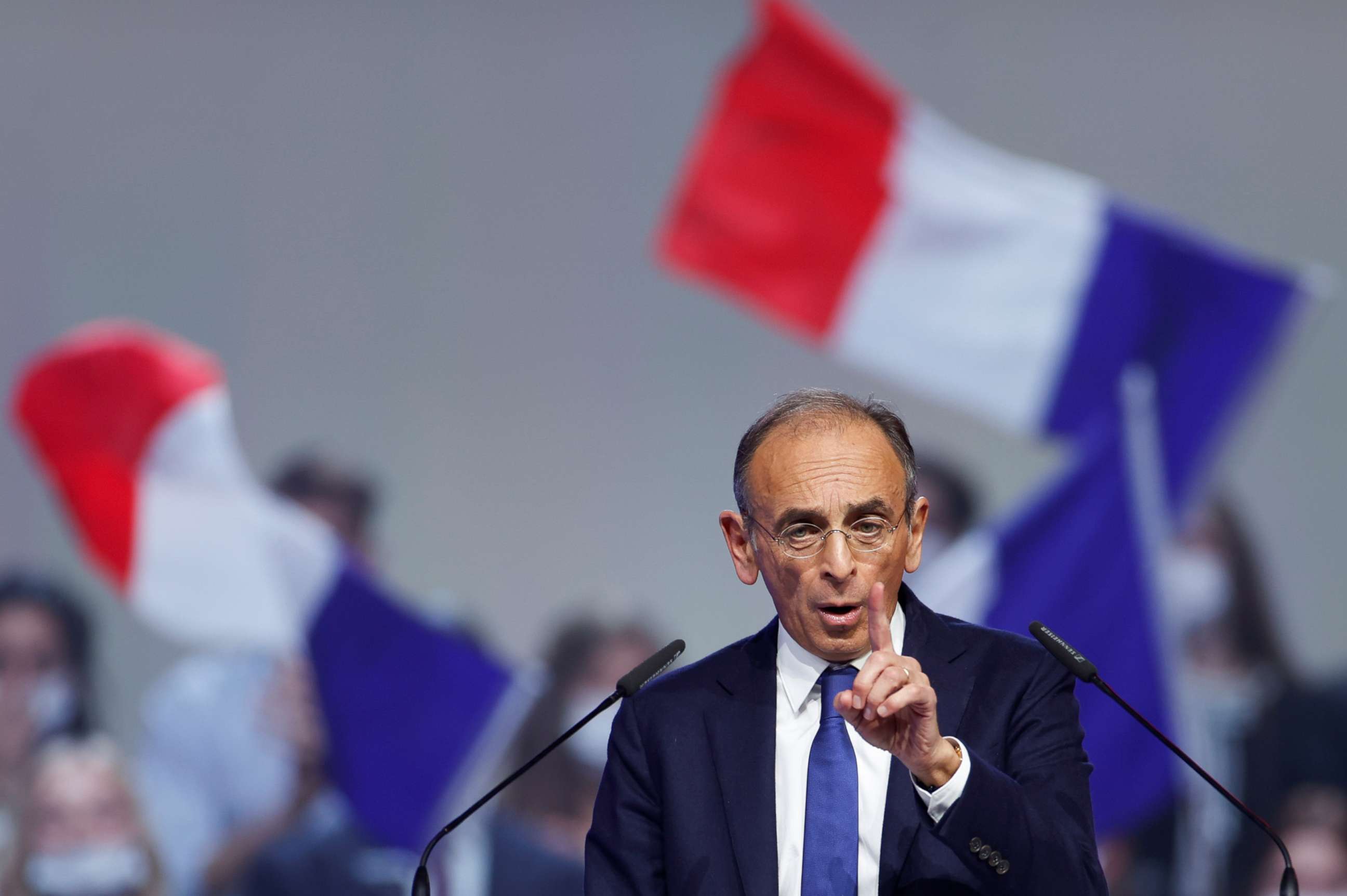Far-right pundit vies for French presidential office
The candidate presents himself as a political outsider.
On Sunday, Eric Zemmour, a former journalist and far-right political pundit with tough views on immigration had his first campaign rally as candidate for the French presidential election. Zemmour announced the creation of his own political party, "Reconquête," or "Reconquest," which had already garnered 20,000 supporters in two days, according to French media outlet, BFMTV.
During his televised speech,violence broke out between Zemmour's supporters and protesters from the organization SOS Racism. Sixty-two people were arrested according to French paper Le Parisien, including some members of SOS racism. Zemmour was also attacked by a protester in the crowd, The Associated Press reported.

Zemmour, who presents himself as a right-wing political outsider, has been referred to by some as the "French Trump," with a political playbook full of controversial comments and attacks on the press. "For months our meetings have bothered journalists, annoyed politicians and driven mad the left," he said at Sunday's meeting.
The candidate exists outside traditional political parties, and uses rhetoric that even Marine Le Pen and the National Rally -- the far-right party in France, formerly called the National Front -- stay away from.
Zemmour has been fined for hate speech. In 2011, he was fined 10,000 euros for claiming on TV that "most drug dealers are black and Arab," and in 2018 he was ordered to pay 3,000 euros for stigmatizing comments about a Muslim "invasion" of France, The Telegraph and other outlets reported.
"He is the only one in France to use the theory of "great replacement ... even Marine Le Pen does not use that term," said Jean Yves Camus, a political scientist and director of the Observatory for Political Radicalism, adding: "for Zemmour, the French population has been changed, and French people are now a minority on their own land."
The theory of great replacement is an idea among France's political far-right that French people will become minorities in their country after being replaced by immigrants.
If elected, Zemmour has said he wants to deport all immigrants convicted of crimes and incarcerated in French prisons back to their countries of origin, and take away social benefits for foreigners and immigrants who do not yet have French nationality. He also has espoused making immigrants prove they know the French language and are ready to assimilate to French culture.
Similarly to Trump, Zemmour is seen as someone who appeals to a part of the French population that is anxious about the future. "He is speaking to a French society that is particularly anxious, the most pessimistic nation in Europe ... but this country is not doing so bad," Camus said.
Zemmour's economic plan is considered more liberal than Le Pen's say experts who spoke with ABC News, and focuses more on the free market and the simplification of French bureaucracy, something that the experts say is appealing to upper-class voters.

But the comparison to Trump is an imperfect one, because of Zemmour's long-standing ingratiation with the French elite. "Zemmour has the elites, Le Pen has the people," said Nicolas Lebourg, a historian and specialist of far-right movements.
For Camus, the fact that Zemmour was a journalist for a mainstream newspaper, Le Figaro, and has been seen on television by voters for the past few decades puts him at an advantage from Marine Le Pen who cannot get out of the shadow of her father, Jean Marie Le Pen and the National Front's extremist history.
"[Zemmour] was seen as someone on the right, resolutely conservative on the questions of identity and immigration, but he does not have a far-right history like Marine Le Pen," says Camus.
Zemmour’s tough stand on immigration include his plans, if elected, he says to reduce the amount of immigrants and asylum seekers who are allowed to enter the country each year, and would only admit those willing to “assimilate," although he is not clear on how he would measure assimilation. A recent report from the Organisation for Economic Cooperation and Development (OECD) shows that France’s population is composed of only 13% immigrants, less than its neighbors such as Germany.
Zemmour has also suggested reviving an 1803 law which was abolished in 1993 requiring parents to only give their children historically and traditionally French names.
Meanwhile, Zemmour has presented himself as a model for successful integration. “I am a Jewish man from Algeria who grew up in the Paris banlieue, and whose family heritage and readings transformed into a French man of land and ancestors,” he wrote in his latest book, "France Has Not Said its Last Word."
A strong critic of the American "melting pot" approach to immigration, Zemmour often uses America as an anti-model. "[Zemmour] ... thinks everything wrong in France is an import of everything that is wrong in America," says Lebourg.

At an October 2020 rally in Versailles, Zemmour described "woke" culture as a plot to make "white, heterosexual, Catholic" men feel "so full of guilt" that they willingly abandon their "culture and civilization."
The French presidential election will take place from April 10-24. The latest polls show Zemmour in fourth place after President Emmanuel Macron, Republican candidate Valerie Pecresse and Marine Le Pen.
Zemmour needs 500 signatures from local mayors to secure a place on the ballot, as per French law.




